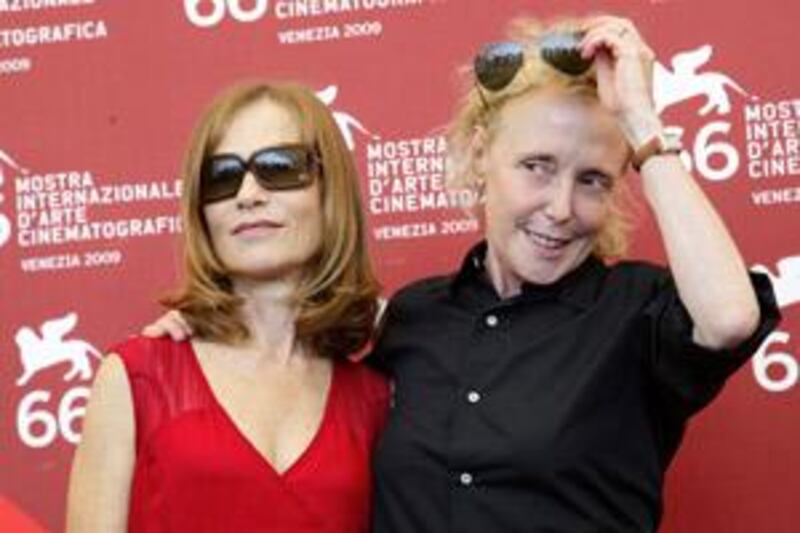When White Material premiered at the Venice Film Festival, many critics expected it to win the Golden Lion. It was outgunned by Samuel Maoz's Lebanon, but that is no slight to the film in which the director Claire Denis once again draws inspiration from Africa, where she spent much of her youth. Denis was born in France but her father worked as a French official in colonial Africa. He insisted that the family move often, and she says her African heritage only went so far: "The chance that I had to grow up in different countries of Africa, not just Cameroon [where White Material was filmed], was also the chance to be educated by a family that made it very clear to me that it was not my roots; my roots were in France. I was there because my father was working. He was not a land owner, not a farmer, and he raised us in the idea that we were lucky to grow up in other countries but we were rooted in France.
"In my experience, a lot of white people in Africa feel that they are bigger in Africa, more beautiful in Africa than in their own country. They have a fantasy about being in an adventurous life where they are not banal - although they are very banal. It makes them believe that they have a noirish sort of poetry about their adventurous life." In her 1988 debut film, Chocolat, the provocatively named principal character, France (Mireille Perrier), returns to Cameroon to reminisce about her youth. Beau Travail, Denis's 1999 masterpiece, was loosely inspired by the central conflict between a handsome young sailor and his sinister superior in Herman Melville's novella Billy Budd. The lyrical, poetic story takes place among a group of French Legionnaires in East Africa and highlights the tensions felt by outsiders.
Now White Material, her latest Africa-set film, is playing in competition at MEIFF. It features Isabelle Huppert as a coffee plantation owner who refuses to abandon her crop as an escalating civil war drives the country into anarchy. At every turn, she has to defend her decision to stay in Africa. Although the country in which the story is set is never named, the film was shot in Cameroon, a country that Denis vividly remembers declaring independence.
Huppert, it turns out, deserves some credit for Denis's latest expedition to Africa. "Isabelle told me that she wanted to do a film in Africa with me," Denis says. "She read a book written by Doris Lessing that she loved. It's a very beautiful book that Lessing wrote about her parents called The Grass Is Singing. "Isabelle wanted me to adapt it. I told her that I was not able to do a period film in South Africa because it's not how know Africa, and so I felt unable to do that. I told her that I wished to do something together, but something about today. I said: 'Let's do something that I can understand.'"
Denis says she has to feel some connection to the stories in order to make them. The same was true of her last film, 35 Shots of Rum, which was as much about her mother's relationship with her grandfather as it was about the problems facing a black family in Paris. Casting is also important to her filmmaking, Denis says: "Alex Descas is my favourite actor. So to interpret my own grandfather I thought that he was the best guy. This decision to make him the grandfather changed the story a little, as I decided to make it a Martinique community. The same is true for Gregoire Colin. I wanted to work more and more with him. I don't have a very large range of imagination and I often like to work with the same people. When I met Gregoire he was 14 or 15, and in 35 Shots he's 29. It's so great."
Her approach is enthralling because Denis doesn't fall into the trap of offering simple interpretations. No one is all good or all bad. In White Material, even the soldiers fighting each other are more than one-dimensional characters. "I do believe life is like that," Denis says. "I always fear, even for myself, having to decide this is what is, and point out that something is bad. It's not like Heart of Darkness. I'm not like Joseph Conrad in that sense. I do not believe in that primitivism. I think it's another cliché, and it's a beautiful fantasy, but it's a fantasy."
Denis's life also has some fantastic qualities. When she returned to France, she interned at a television station, working with some of the greats of the New Wave. She was especially enamoured by Jacque Rivette. She worked in the US with Wim Wenders on Paris, Texas, and befriended the actor/directors John Cassavetes and Jim Jarmusch. She also spent a year working with Costa Gavras before she decided to go behind the camera herself. Each of these directors' influence can be seen on the mystical quality of her work. It's little surprise, given her eclectic life, that her films are so special.






